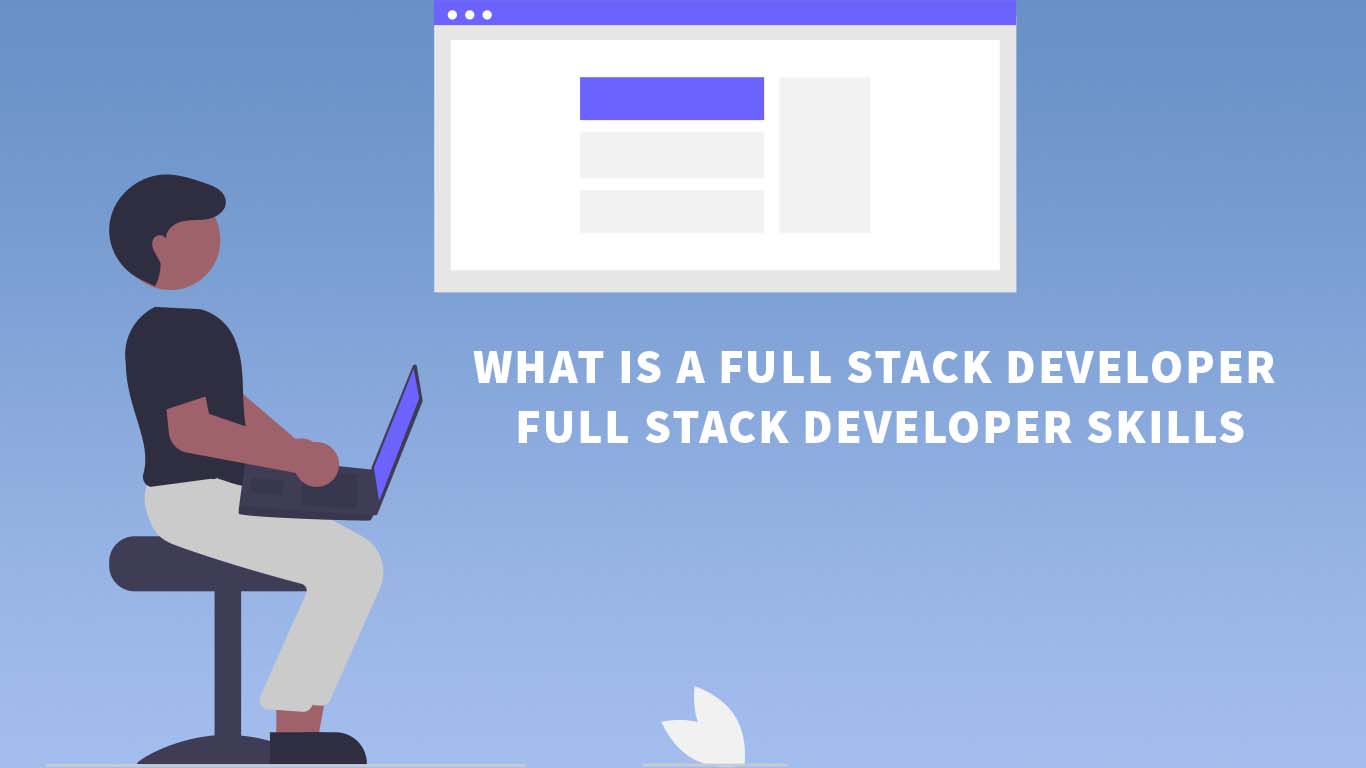If you are new in the IT industry and become a developer then you might have heard of the word full stack developer. But What is a full stack developer?
What is Full Stack Developer?
A Full Stack Developer is a programmer who has expertise in both frontend and backend development. They possess a broad range of skills and are proficient in various technologies used in building web applications.
Frontend development involves creating user interfaces, which the user interacts with directly, using languages such as HTML, CSS, and JavaScript. A Full Stack Developer must be able to create responsive and user-friendly designs that can run on multiple devices.
Backend development, on the other hand, involves the development of the server side of an application. This includes the database, server logic, and APIs. A Full Stack Developer must have the knowledge and skills to create robust, secure, and scalable backend systems.
In addition to frontend and backend development, Full Stack Developers must also have a good understanding of web development concepts, such as HTTP protocols, databases, servers, and hosting environments.
Overall, Full Stack Developers are responsible for creating and maintaining complete web applications, from the frontend to the backend, making them a valuable asset to any development team.
Skills of a Full Stack Developer
A Full Stack Developer is a versatile and highly skilled programmer who is capable of working on both frontend and backend aspects of web development. They are proficient in a range of technologies and programming languages that allow them to build complete web applications from start to finish.
In this article, we will discuss the essential skills that a Full Stack Developer should have to become a successful and competent developer.
1. HTML/CSS
HTML and CSS are the backbone of any web application. HTML (Hyper Text Markup Language) is used to create the structure of a web page, while CSS (Cascading Style Sheets) is used to style and design the page. Full Stack Developers must have a strong understanding of HTML and CSS to create responsive and visually appealing designs.
1. JavaScript
JavaScript is the most popular language for frontend development. It is used to create interactive web pages and add functionality to a website. A Full Stack Developer must have an in-depth knowledge of JavaScript, including its syntax, frameworks, and libraries, such as Angular, React, and Vue.
3. Backend Programming Languages
Full Stack Developers must also have a strong understanding of at least one backend programming language. Popular backend languages include PHP, Python, Ruby, and Java. A Full Stack Developer should be able to write clean, efficient, and scalable code in their chosen language.
4. Databases
Databases are a crucial component of any web application. Full Stack Developers must be proficient in at least one database technology, such as MySQL, PostgreSQL, MongoDB, or Cassandra. They must be able to create and manage databases, write complex queries, and ensure the data is secure and easily accessible.
5. APIs (Application Programming Interfaces)
APIs are used to connect different components of a web application, allowing data to be shared and accessed between them. Full Stack Developers should be proficient in creating and consuming APIs, using tools such as REST and SOAP.
6. Version Control
Version control is a crucial aspect of software development. Full Stack Developers should be proficient in using version control systems such as Git and SVN, to manage changes to the codebase, collaborate with other developers, and ensure that the code is well-documented and easy to maintain.
7. Server Management
Full Stack Developers should have an understanding of server management, including deploying and configuring servers, managing hosting environments, and ensuring the application runs smoothly. They must be able to monitor server performance, troubleshoot issues, and ensure that the server is secure.
8. Testing and Debugging
Full Stack Developers should be skilled in testing and debugging their code. They must be able to write unit tests, integration tests, and end-to-end tests to ensure that the application works as expected. They should also be proficient in using debugging tools to identify and fix errors in the code.
9. Agile Development
Agile development is a methodology that is widely used in software development. Full Stack Developers should be familiar with Agile principles, such as Scrum and Kanban, and be able to work in a team environment, collaborate with other developers, and adapt to changing requirements.
10. Soft Skills
Full Stack Developers should also possess soft skills, such as communication, problem-solving, and teamwork. They must be able to communicate effectively with clients and team members, work well under pressure, and be willing to learn new technologies and programming languages.
In conclusion, Full Stack Developers are highly skilled programmers who possess a broad range of skills and expertise in both frontend and backend development. They must have a strong understanding of HTML/CSS, JavaScript, backend programming languages, databases, APIs, version control, server management, testing and debugging, Agile development, and soft skills. By mastering these skills, Full Stack Developers can build complete and robust web applications, making them a valuable asset to any development team.
How to become a full stack developer?
Becoming a Full Stack Developer requires a combination of technical skills and practical experience. Here are the steps to become a Full Stack Developer:
-
Learn the Fundamentals: Start by learning the fundamentals of web development, such as HTML, CSS, and JavaScript. These are the building blocks of any web application and form the foundation of your development skills.
-
Choose a Backend Programming Language: Choose a backend programming language that suits your interests and goals. Popular backend languages include Python, Ruby, PHP, and Java. You should have a good understanding of data structures, algorithms, and object-oriented programming (OOP) concepts.
-
Understand Databases: Learn how to create and manage databases using SQL or NoSQL technologies such as MySQL, PostgreSQL, MongoDB, and Cassandra. Understand the principles of database design, data modeling, and data normalization.
-
Get Familiar with Web Frameworks: Learn how to use web frameworks such as Django, Ruby on Rails, Laravel, and Flask to create backend applications. Web frameworks provide a structure and set of tools to help you develop web applications faster.
-
Learn Frontend Frameworks and Libraries: Learn frontend frameworks such as React, Angular, and Vue, which help you create responsive and dynamic user interfaces. Also, learn popular frontend libraries such as jQuery and Bootstrap.
-
Learn API Development: APIs (Application Programming Interfaces) allow communication between different components of a web application. Learn how to create RESTful APIs using tools such as Django REST Framework or Ruby on Rails API.
-
Learn Version Control: Learn how to use Git and Github, which are essential tools for version control and collaboration with other developers.
-
Build Projects: Practice building projects that incorporate all the skills you have learned so far. This will help you develop a portfolio that showcases your abilities as a Full Stack Developer.
-
Stay Up-to-Date: Keep up with the latest trends and technologies in web development. Attend meetups, conferences, and online courses to keep your skills current.
-
Gain Practical Experience: Gain practical experience by working on real-world projects or contributing to open-source projects. This will help you develop the skills and experience necessary to become a Full Stack Developer.
In conclusion, becoming a Full Stack Developer requires dedication, practice, and a willingness to learn. By following these steps, you can develop the technical skills and practical experience necessary to become a successful Full Stack Developer.
Career Of a Full stack developer:
A career as a Full Stack Developer can be both rewarding and challenging. Full Stack Developers are responsible for building and maintaining web applications, which involves working with a variety of technologies and frameworks. Here are some key aspects of a career as a Full Stack Developer:
Job Outlook and Demand:
The demand for Full Stack Developers is high, and job growth is expected to continue in the coming years. As companies continue to rely on technology for their business operations, the need for skilled Full Stack Developers will only increase.
Salary:
Full Stack Developers are among the highest-paid professionals in the technology industry. According to Payscale, the average salary for a Full Stack Developer is around $77,000 per year, with more experienced developers earning significantly more.
Skills and Knowledge:
To succeed as a Full Stack Developer, you need to have a strong foundation in programming languages such as HTML, CSS, JavaScript, Python, Ruby, and PHP. You should also have a good understanding of web development frameworks such as Django, Ruby on Rails, and Laravel.
In addition to technical skills, Full Stack Developers also need to have good communication and collaboration skills. They often work in teams and need to be able to communicate technical concepts to non-technical stakeholders.
Opportunities for Growth:
As a Full Stack Developer, there are many opportunities for growth and advancement. You can specialize in a particular area of web development such as frontend or backend development or focus on a specific technology stack such as MEAN or MERN. You can also move into management roles such as Technical Lead or Project Manager.
Challenges:
As with any career, being a Full Stack Developer also comes with its challenges. Keeping up with the latest technologies and frameworks can be challenging, as the industry is constantly evolving. Additionally, working on complex projects and managing deadlines can be stressful.
In conclusion, a career as a Full Stack Developer can be highly rewarding for those who enjoy working with technology and are willing to continuously learn and improve their skills. With high demand, competitive salaries, and opportunities for growth, it is a great career choice for those interested in web development
Conclusion:
A Full Stack Developer is a professional who has the technical skills and practical experience to build and maintain web applications. They work with a variety of technologies and frameworks, and need to have a good understanding of both frontend and backend development.
A career as a Full Stack Developer can be highly rewarding, with competitive salaries, high demand, and opportunities for growth and advancement. However, it also comes with its challenges, including keeping up with the latest technologies and managing deadlines.
To become a Full Stack Developer, one needs to have a strong foundation in programming languages, web development frameworks, and databases. It is also important to have good communication and collaboration skills, as Full Stack Developers often work in teams and need to be able to communicate technical concepts to non-technical stakeholders.
Overall, a career as a Full Stack Developer can be a great choice for those interested in web development and technology. With the right skills, dedication, and willingness to continuously learn and improve, one can have a successful and fulfilling career as a Full Stack Developer.


